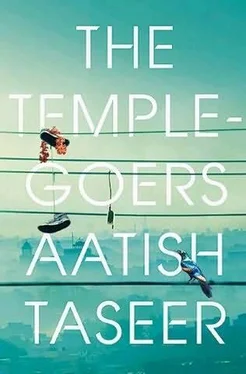He was a stubborn man, of this there is no doubt. But there was nothing he had been more stubborn about than his determination to be a poet against terrible odds. In the car home, as if remembering who he was, he told me the story of how he got his pen name. ‘I was called Muhammad Shafiq,’ he said, ‘but when I was about seven or eight, I became enchanted with the word aashiyan; I didn’t know what it meant, but I liked the ring of it. So I kept it as my pen name, Muhammad Shafiq Aashiyan. And I began to use it in my schoolwork. A few weeks later, the teacher was calling out our names and she said, “Come here, Muhammad Shafiq Nest.” My face became red with shame. Aashiyan means “nest”, like bird’s nest!’ Zafar’s rasping laugh broke from his blackened lips. ‘It was then that she said to me, “If you want to be a poet call yourself Jigar or Kamar or Zafar.” And since there was already a Jigar and Kamar Moradabadi, I called myself Zafar.’
Uttam stopped the car in front of the art-deco cinema. The area had now returned to life and was teeming with rickshaws, pedestrians and naked bulbs in shop windows. There was nothing to suggest the morning’s disturbance except a column of yellow metal barricades, gathered neatly at the side of the road.
Zafar stepped out of the car, with some relief I thought, perhaps at being his own man for the first time all day. After a hurried goodbye, he vanished around a gloomy corner, illuminated by a single street light, heading home to the house and family which had once again eluded me.
Sanyogita had begun to see a therapist. She said that there were many things she needed to sort through, related to her mother and aunt. Things that might explain her inactivity in adult life. They were both, in different ways, strong women; she felt they might have stifled her. The therapist was fast to confirm these doubts. He had Sanyogita write a letter to both women, a letter Chamunda later described to me as ‘four pages of pure vitriol’, with accusations that she abused her. ‘She accuses me of calling her a “stupid child” when she was little,’ Chamunda ranted down the phone. ‘One says that! It’s like saying, “Stupid boy”. It doesn’t mean “you are a stupid boy”.’ I could imagine her wagging a jewelled finger as she spoke. ‘Aatish, please speak to her. She’s left a lot of hurt in this house. I’m told by a friend who’s had years in psychoanalysis that they blame the family as the source of all troubles. But, Aatish, I know if she would only get married and pop out a child or two, all of this would go away. And guess who introduced her to this psychoanalyst?’
‘Who?’
‘That fat cow Shabby.’
Chamunda, as Sanyogita’s guardian in Delhi, was forever asking me to make her understand some particular point of view or to get her to agree to come to some event she was hosting. Most of the time I was happy to make her case, but lately my own position with Sanyogita was not what it had once been. While I had been distracted with Aakash and then Zafar, I had moved slowly from being one of the people Sanyogita considered on her side, to one of the people she viewed with suspicion.
It had begun the night Aakash pushed her over; the summer of boredom and flight had not helped; the two dinners, at the Oberoi and at my mother’s, had made things still worse; and my general state of preoccupation prevented me from seeing many opportunities for repair. She was someone in whom these emotions percolated slowly, but once a definite shift had occurred, a reversal would have required the full use of my emotional energies.
And these were divided. In the period when Megha had been abducted to the lipo clinic, and Aakash was organizing the jagran in his colony, he made great emotional demands on me. I saw him nearly every day, Junglee aside, spoke to him two or three times and received countless text messages. He had become a master of the text message. In his bad, broken English, he always succeeded in expressing some forceful emotion or plan that would change the course of my day. There was also a powerful sexual tone to these messages. I might be sitting with Sanyogita, the heater yawning in front of us, and my phone would beep. Sanyogita, now wise to the fact that 90 per cent of these messages were from Aakash, would get up or look away. The moment would be spoiled for her. Still worse was the suppressed expression of amusement on my face.
Going against all her high notions of privacy, she would ask, though feigning boredom, ‘What does he say now?’
‘Nothing, nothing,’ I would reply, still smiling.
She would press me; I would try and laugh it off; she would become agitated and we would have a fight. ‘If it’s nothing, why can’t you tell me what it is?’ she’d ask.
‘Because it’s just the principle of it,’ I would reply half-heartedly. ‘I don’t ask you what Ra says in his text messages.’
‘Yes, but the point is that we don’t have these fights about Ra, do we?’
‘We might if I was to start hounding you in this way.’
An acid silence would fall over the room. I would think back to the message, seeking solace in the playful mood in which it was sent. The message might say: ‘Arse bandit.’ How Aakash had learned that expression, or come to find it amusing enough to put it in a message, without any provocation, and send it to me, I don’t know. But it was part of a string of messages of this kind. The first, literally the first, after I told him I had a new Nokia, was, ‘It’s lost its virginity to me, that phone will never be the same.’ A few days later he wanted me to have lunch with him. When I said that I would have loved to but couldn’t, as I was meant to be having lunch with Sanyogita, he wrote at 21.39: ‘That is going to be your problem, for you have to be with Sanyogita. All I can suggest is that we make a concoction like you wouldn’t believe for her which knocks her out for a couple of days.’ The next day he told me he’d spoken to Megha and that, though they could only speak for a few minutes, she was fine and would be back soon; the lipo had made a great difference. He also said that when she was back, he was going to make her have lunch with Sanyogita on the days when he wanted to have lunch or a drink with me alone. I replied, referring to Megha’s condition, ‘Good to hear it,’ to which he, at 14.49, while I was still at lunch with Sanyogita, replied, ‘I thought you might like that. I told her that she’d better start making friends with Sanyogita if she wanted our relationship to progress.’ Then at 14.53, four minutes later, ‘What if they end up fucking each other?’
And it was in this way that Aakash began to excite a fresh tension in our friendship. I knew from the start that it was only his vanity declaring itself in new and corrosive ways. He liked now to speak of bisexuals and metrosexuals, sometimes confusing the two, but like his ‘messy look’, it was really just a part he was trying out. It gave him an illusion of privilege and indulgence. And he always needed his audience. We would come back after an afternoon of drinking – we drank a lot in those days – and he would stand behind me, as Sanyogita lay on a sofa reading, and begin massaging my shoulders. In the mirror in front of me, I could see a large potted fern, the white sofa on which Sanyogita lay and Aakash in a small, tight T-shirt, the afternoon light striking the vein-like muscles in his arms, making golden their pale inner portion. If Sanyogita ignored the tension of the three-way scene, he would say, ‘Bhabi, do you massage him? Do you treat him well? You know, he needs it.’ Sanyogita then either played along or laughed it off, but I could see that her eyes shone painfully. I would shrug off Aakash’s attentions, and he would drift around the room, lightly fingering the bookshelves or picking up and closely inspecting an objet. Till just the other day, any mention of homosexuality had appalled him. He had once said to me, like with the Muslims, that they must be killed off. But now again, like a preparation for a future life, he tried out a new self.
Читать дальше












